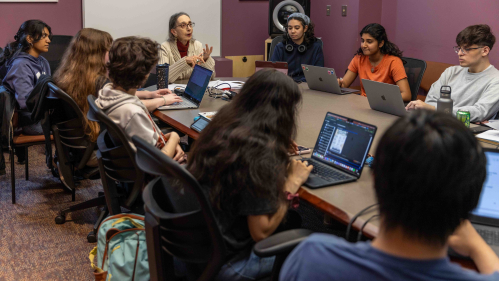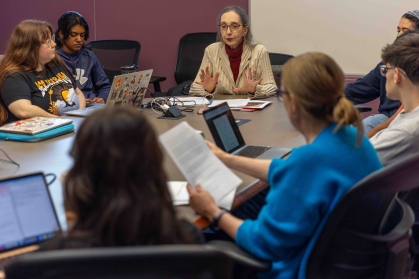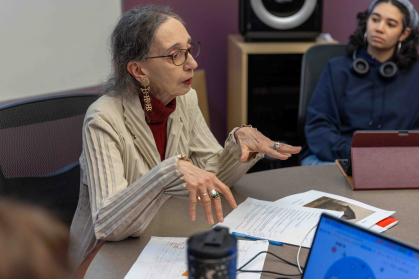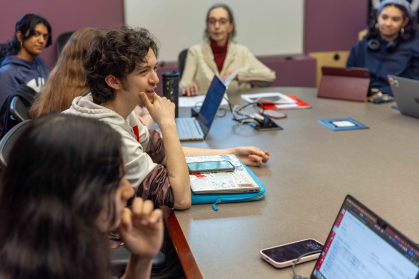A Workshop Like No Other: Inside Joyce Carol Oates’ Rutgers Classroom

Since 2020, one of the most prolific authors in American literary history has been working to help shape a new generation of Rutgers writers, poets and playwrights
For Blake McGowan, English 407 at Rutgers University-New Brunswick was an opportunity to spread his creative wings, find his voice and become acquainted with the brilliance of writers such as Hemingway and Updike.
It was also, thanks to his instructor Joyce Carol Oates, a chance to polish his prose with one of the greatest living fiction writers.

“We would read these famous authors, and Joyce would say, ‘You guys can do something like that,’” said McGowan, who graduated from Rutgers in 2024 and is pursuing a master of fine arts degree in fiction at New York University. “Her support shifted my mindset and has made writing a lot more generative and fun.”
Since 2020, Oates, one of the most prolific writers in American history, has helped Rutgers students such as McGowan navigate the notoriously difficult literary world. Her influence as a writing coach and mentor – she has thousands of books, essays, novels and short stories to her credit – has been nothing short of life-changing, said those fortunate enough to study with her.
“People might not expect it from such a well-known author, but Joyce cares deeply about the work presented in her class,” said McGowan, who used his time with Oates to develop a novel about wrestling, Cutting Weight, which he hopes to publish soon.
Undergraduates learn much from being in a class with older writers – the dynamic is ideal. Much of a writing workshop is oral critiques – the writer gets to hear a mix of reactions to their work. It is often enormously beneficial.
Joyce Carol Oates
“She reads each story multiple times and invests in her students on both the micro and macro level – the potential of the story and the potential of the writer,” he said.
Oates’ course, “Advanced Creative Writing Fiction,” is unique among Rutgers classes. Admission is competitive: Students must submit an original work of fiction to be considered. Oates then selects a mix of about 15 undergraduates, graduates and even full-time faculty to participate during the in-person sessions.
Oates said the formula works well.
“Undergraduates learn much from being in a class with older writers – the dynamic is ideal,” she said. “Much of a writing workshop is oral critiques – the writer gets to hear a mix of reactions to their work. It is often enormously beneficial.”

Barry Qualls, former vice president of undergraduate education and professor emeritus of English at Rutgers, said Oates brings out the best in every writer she engages.
“When teaching writers, especially young writers, you want to help them get a sense of their creative potential but also the discipline – form and structure – that writing well requires,” said Qualls, who has known Oates personally for decades. “Joyce is very good at that.”
Rutgers has no shortage of talented writers among its faculty and alumni, including poet Evie Shockley, head of the creative writing program and director of Rutgers’ Writers House; Mark Doty, winner of the National Book Award for Poetry in 2008; Pulitzer Prize winner Junot Díaz, who graduated from Rutgers in 1992; and novelist Philip Roth, who attended Rutgers as an undergraduate.
Qualls said that the university’s strong writing program helps to attract top faculty. “It’s good for students to study under authors as well-known as Joyce. It brings marquee value.”
Yet Oates’ effectiveness stems not from her notoriety, but rather, from her “amazing curiosity” and “discipline,” Qualls said.
“I went to Paris with her once, for a horror film festival,” Qualls recalled. “We got in the taxi, and Joyce opened her laptop and started typing away. She's remarkable. I enjoy her company immensely, but I’m also intimidated beyond belief by her discipline.”
When teaching writers, especially young writers, you want to help them get a sense of their creative potential but also the discipline – form and structure – that writing well requires. Joyce is very good at that.
Barry Qualls
Former Vice President of Undergraduate Education and Professor Emeritus of English at Rutgers
Now 86, Oates has been teaching writing for nearly 60 years. She spent a decade at the University of Windsor before moving to Princeton in 1978, where she taught until her retirement from full-time teaching in 2015. Today, she continues to teach workshops at Princeton, NYU and Rutgers.
John Hulme, a Rutgers writing professor whose forthcoming book, No Man’s Land, was workshopped during an Oates seminar, said he’s a better writer because of English 407.
“She creates such great energy in the room,” Hulme said. “She’s unintimidating and open to all kinds of writing – fantasy, memoir, horror, journaling. She attacks everything so energetically.”
As with many Rutgers writers, Hulme admired Oates long before stepping into her classroom. In the 1990s, when he was just “working up the courage to become a professional writer,” a friend gave him a copy of Oates’ haunting short story, Where Are You Going, Where Have You Been?
“Her interest in widely different genres has pushed me and held me accountable,” he said. “Her encouragement helped me explore ideas in short story formats that I wouldn’t have tried otherwise.”
Oates can be brutally honest – if a piece isn’t working, she says so – but always with the intention of helping students improve.

“Her workshops are rigorous,” said Aimee LaBrie, a creative writing instructor and senior program coordinator at Writers House who has taken Oates’ class. “She’s a line-by-line person and is very good at suggesting alternate storylines that raise the stakes. She’ll say, ‘What if?’ and show students how to bring the story to life.
“She truly loves storytelling and is energized by other people’s work,” LaBrie continued. “If you send her a piece for a workshop, she’ll read it, and two days later you’ll have comments. She’s like seven people in one – she just loves talking about stories, how they work or how they don’t. That’s who she is.”


